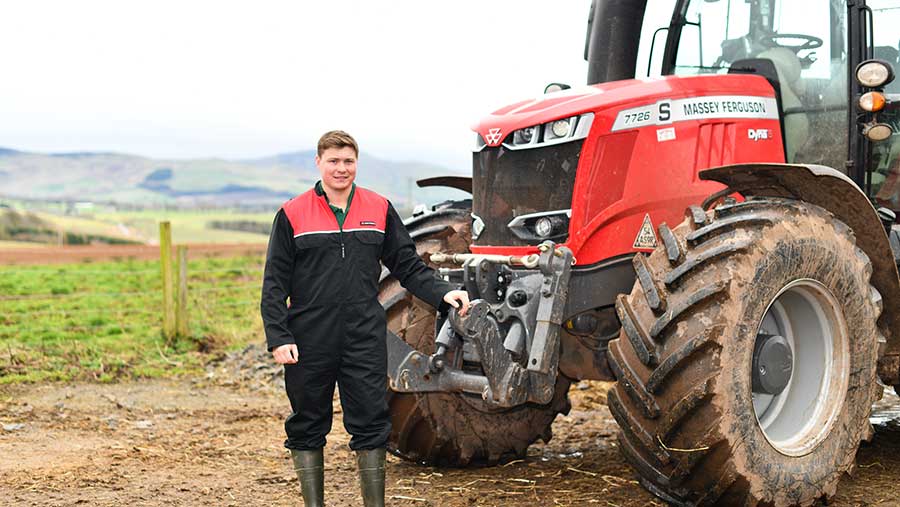Advertiser content
How Lantra can help solve farming’s skills shortage
Provided by
Lantra is a skills charity, committed to supporting workforce development in the environmental and land-based sector by providing comprehensive careers information, robust industry intelligence, and nationally recognised training and qualifications.
It’s National Careers Week and a perfect time to explore the rewarding employment opportunities land-based industries have to offer.
Lantra’s CEO Marcus Potter explains how the organisation’s new website can help.

© Lantra
Why have you decided to launch a new website?
Finding your dream job or the next step on the ladder can be a daunting task, as information sources are limited.
Colleges and universities offer some of their own information and advice, but this is fragmented and not always easy to find.
We wanted to make it simpler for those interested in a career in environment and land-based industries like farming to get the help they need, all in one convenient place.
There is also a skills shortage throughout the food supply chain, from production on farm through to processing, and we feel a duty to help meet this challenge.
A 2022 Institute of Agriculture and Horticulture (TIAH) survey of 681 farming employers reported that 25% were currently seeking staff and 63% said filling vacancies was “difficult”.
Certified tractor drivers and sprayer operators, stock/herdspersons and general farm workers were some of the hard-to-fill roles, and knowledge or skills in health and safety, environmental and regulatory, basic IT and biosecurity are lacking in the talent pool.
This makes it hard for employers to find the right people and the lack of skills and knowledge also has implications for staff productivity.
Recent changes to agricultural policy, with food producers now having sustainability and net-zero obligations to meet, is only exacerbating the situation, as it requires a completely new set of skills.
Agriculture is no longer the sector for low skilled workers it’s perceived to be and we hope the new resource will help people find and fill vacancies and solve the labour and skills shortage.

Kirsty Muirden © Lantra
Why has Lantra taken a lead on careers information?
After government funding to sector skills councils was cut in 2014, Lantra wound down its careers services and focussed solely on training, which remains one of its core offerings.
We are a not-for-profit organisation and now the training side of the business is making a surplus, we have taken the opportunity to reinvest and reinvigorate our role as a national careers information provider.
Lantra also felt that some preconceptions about farming and other land-based industries needed to be challenged.
By doing this through the website and other media, we hope the initiative will help deepen the talent pool available to employers.
This includes promoting women in land-based roles traditionally dominated by men and tapping into inner city and ethnic communities, whose members may not be aware of the opportunities available.
We are also increasing investment in granular research to identify where the skills shortages are.
We can then use that information to improve our training offering or work with specialist third parties to deliver on industry needs.

Matthew Douglas © Lantra
How will the website help career seekers?
Lantra has designed its website to showcase more than 250 roles across land-based sectors, with a significant chunk related to food production.
Users can browse these roles, find detailed information on qualifications and training needed and how to get it, expected pay and conditions, and common day-to-day tasks.
In many sectors, career progression is very structured and linear, but it is not always as clear cut in agriculture and horticulture.
That is why the website also outlines career progression opportunities that might arise from each role, shaking off the assumption that farming is low-paid, low-skilled and offers little chance of moving up the ladder.
There are cases where an employee has started as a herdsperson on a stock farm and is now agriculture manager for a major food company.
We give an indication of the path a career might take with the right training and qualifications.
How will the website help employers?
The 2022 TIAH report suggests that 37% of business respondents are not confident of retaining staff and some 45% had lost staff in the past 12 months before responding.
The new website can show employers the skills and training their employees need and how to facilitate courses, which helps make staff feel valued. In turn, this will increase productivity and help retain people long-term.
With farming’s poor safety record, investing in staff will also make them safer and increasingly important is education on working in a more environmentally friendly manner within land-based industries.
An example of that would be training on how to cut a hedge properly, creating a biodiverse habitat rather than something hit back hard and providing little value to wildlife.
That can really improve your sustainability credentials as a farming business.
What about apprenticeships?
Lantra already helps with course assessments of land-based apprenticeships and is currently undertaking some research as to what the barriers are for small businesses taking on apprentices.
We believe we know why apprenticeships are an underutilised tool for recruiting and retaining staff in farming, which is a lack of information and advice on how to navigate the process successfully.
Lantra is conducting some research to confirm this assumption and aim to provide a toolkit on the website and in printed format, providing basic information about how they work, how to recruit the right apprentice, look after them and get the best out of them.
Go to www.lantra.co.uk to find out more.
Careers services from Lantra – key points
- Lantra launches new website resource for careers in land-based industries
- Shows key information about various roles, including skills requirements
- Employees can learn how their career might progress within the sector
- Employers benefit by finding ways to upskill and retain staff
- Information on apprenticeships available soon
New website can help promote exciting farm careers
Wiltshire farmer and contractor Rob Boole thinks the new digital careers resource from Lantra could help break down some of the stigmas surrounding agricultural jobs – especially regarding pay – and entice new entrants into the industry.

Rob Boole © Lantra
The family business, which he runs alongside his mother and father, contract farms more than 200ha and covers more than 20,000ha with its four Bateman sprayers annually.
Mr Boole attended a school in an urban area where agriculture was seen as the last choice for school leavers, or a closed shop for those already associated with farming through family.
However, the reality is that working for a modern farming business like his own is highly technical, with his staff operating the latest modern machinery with GPS guidance.
The uptake of such technology, as well as data tools, automation and robotics, is only going to increase and should help inspire more young people – or those changing careers – to choose farming.
“The thought of planting seed in September, then 12 months later loading a lorry full of grain that you’ve produced to be taken for processing as a result of all your hard work can be extremely rewarding.”
Mr Boole thinks Lantra’s new website will be an important resource for new entrants to access information about the positive opportunities within farming.
He would also like to see things like machinery simulators used to get youngsters inspired to become skilled operators, which are in short supply.
“Farming has its challenges, but food production is only going to become more important as the global population increases.
“There are many reasons to be positive about the industry and there are plenty of exciting and interesting career paths out there for people to follow,” adds Mr Boole.
